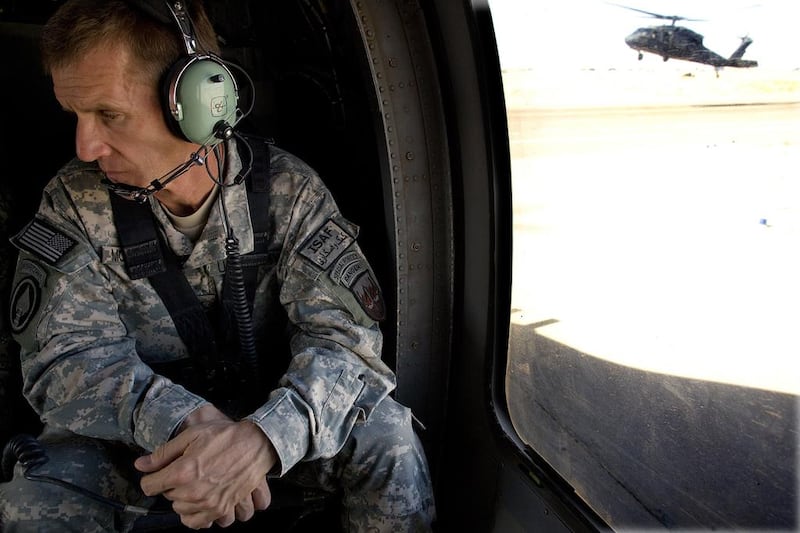Late last month, Barack Obama stood in front of an adoring audience in Berlin to defend the drone strikes that were central to his counter-terrorism strategy. Obama relied on drones and Special Forces as a cheaper alternative to the manpower-intensive counter-insurgency strategy foisted upon his predecessor George W Bush in his second term.
Obama’s strategy paid domestic dividends as it reduced the material and human costs of war and, in the assassination of Osama bin Laden provided Obama with an imperishable talking point.
This is how Obama insists his foreign policy is understood; and this is its implied portrayal in the new Netflix film War Machine.
With a budget of US $60 million (Dh220 million), the film is "inspired by" the late Rolling Stone journalist Michael Hastings's book The Operators, which was itself expanded from his Rolling Stone article The Runaway General. Brad Pitt plays General Glen McMahon, a fictionalised version of General Stanley McChrystal, who was the subject of the article that precipitated his fall.
The film’s creative license is not confined to McMahon’s characterisation or name, however. It also has a political bent. Consider the contrast between an incident as portrayed in the film and as reported by Hastings.
When Sean Cullen (the character based on Hastings) first meets McMahon and introduces himself as a Rolling Stone journalist, the general asks him to put him on the cover.
“It’s between you and Lady Gaga, sir”, the journalist jokes back. The general asks again. His embarrassed wife tells the journalist that he’s only joking. But the general repeats earnestly: “I just want to get on the cover.” But the scene, as reported by Hastings, has an ironic note. McChrystal’s complete comment is: “I just want to get on the cover so I can finally gain my son’s respect.”
McChrystal's career has failed to impress his son, a musician. And McChrystal, a social liberal in spite of his machismo, believes making the cover of Rolling Stone may change that. It is a joke.
McChrystal was no buffoon and his counter-insurgency strategy (which prioritised winning over local populations) wasn’t quite as mad as it is portrayed in the film. In Iraq it helped to significantly reduce violence after 2007. Indeed, Afghanistan’s condition worsened once McChrystal was replaced with General David Petraeus, who escalated the use of airpower and special operations.
Fundamentally both strategies were doomed because they treated political resolution as an afterthought to military success. But where McChrystal showed some sensitivity to local concerns, the reliance on drone strikes deferred the risk entirely onto local populations.
The myopia of the counter-terrorism policy was best illustrated in Obama’s approach to Syria where the president ignored the causes of the conflict and focused on the symptom (ISIL), thereby exacerbating the situation. This gave the Syrian regime – the main killer – a freer hand.
In Iraq, Obama made a counter-terrorism alliance with the same sectarian forces whose depredations contributed to the rise of ISIL. The resulting escalation destabilised the whole region.
The obtrusive unpalatability of Donald Trump has made the liberal United States forget that Obama’s sins of omission have proved no less disastrous than the sins of commission of his much-reviled predecessor, Bush.
War Machine, partly filmed in the UAE, is a well-intentioned liberal critique of US militarism that decries the US's tendency to avoid political paradoxes by focusing on the bright, clear problems of war (C Wright Mills called it "crackpot realism"). This would be poignant if the film didn't contrast McChrystal's bellicosity with Obama's supposed restraint. Obama's legacy, from Afghanistan, Iraq, Syria to Yemen, is testimony to the fact that in international affairs the consequences of inaction can be as devastating as the consequences of action.
War Machine makes many allusions to Apocalypse Now, from the visual motifs of helicopters flying against the sunset to a Conradian anti-hero who has been led into the heart of darkness. But in diluting the edge of the underlying material and eliminating the complexity of its central character, it ends up as a derivative The Men Who Stare at Goats.
The film tells more than it shows; in case the narrator has failed to tell you what to think, there is a cameo by Tilda Swinton as a left-wing German politician who reiterates the film’s message. This is a shame. Because Hastings wrote a good book and the issues he raised have once again become relevant. His story had the Conradian elements, from the drama of hubristic rise and fall to the fluid borders between civilisation and barbarism. This mountain, however, has delivered a mouse.
The lesson for now is that films tackling difficult subjects need stars to secure audience attention, but they won’t succeed without good storytelling.
Muhammad Idrees Ahmad is a lecturer in digital journalism at the University of Stirling.





